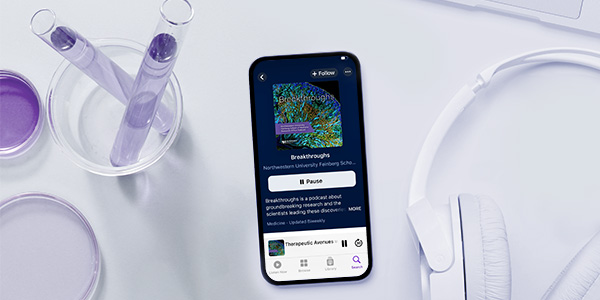Author: hme0988
-

Northwestern Accepting Nominations for $350,000 Nemmers Prize in Medical Science
Northwestern University is accepting nominations for its $350,000 Mechthild Esser Nemmers Prize in Medical Science. The biennial prize will be awarded in fall 2026.
-

Taking the Science to Market: Start-ups at Feinberg
This story was originally published in the June 2025 issue of the Breakthroughs newsletter. Every year at Feinberg, a handful of start-up companies are born from discoveries in the lab. Paperwork is filed for hundreds of inventions and patents; patents are issued and the process for optioning and licensing technology through Northwestern’s Innovations and New Ventures[…]
-

Yue Named to 2025 AIMBE College of Fellows
Feng Yue, PhD, the Duane and Susan Burnham Professor of Molecular Medicine in the Department of Biochemistry and Molecular Genetics, has been inducted into the 2025 class of American Institute for Medical and Biological Engineering (AIMBE) College of Fellows.
-

Pioneering New Techniques in the Fight Against Alzheimer’s Disease
More than seven million Americans aged 65 years and older currently live with Alzheimer’s disease, according to recent estimates from the Alzheimer’s Association. As the prevalence of the disease increases, so does the need for research that identifies underlying mechanisms of disease to enhance the effectiveness of current therapies and inform new therapeutic strategies.
-

Heinemann Receives 2025 Mentor of the Year Award
Feinberg’s Medical Faculty Council honored Allen Heinemann, PhD, the recipient of the 2025 Mentor of the Year award at a virtual and in-person workshop on May 5.
-

Predicting Disease Risk and Improving Patient Outcomes
Investigators are advancing research to support proactive responses in diagnosing and preventing chronic diseases. Across departments, scientists at Feinberg are pursuing new ways of testing to determine a person’s risk of developing chronic conditions.
-

Investigating the Youth Mental Health Crisis
Many have posited the reason for rising mental health concerns among kids and teens – social media, the COVID-19 pandemic, stigma, etc. But the reality is there is a constellation of factors that contribute to this crisis, according to experts.
-

Top 3 Episodes of the Breakthroughs Podcast in 2024
The Breakthroughs podcast released 17 episodes in 2024, on topics ranging from biological age research to new insights in inflammation and microbiome science, as well as health equity research and community engagement efforts.
-

Addressing the Growing Need for Implementation Science
Translating medical research findings from the research laboratory into patient care, otherwise known as from “bench to bedside,” is far more complex than it sounds, but is imperative to improve human health.
-

Esteemed Molecular Biologist Named Winner of 2025 Kimberly Prize
Distinguished biochemist Ron Evans, PhD, director of the Gene Expression Laboratory and professor at the Salk Institute for Biological Studies, has been named the winner of the annual $250,000 Kimberly Prize in Biochemistry and Molecular Genetics.





